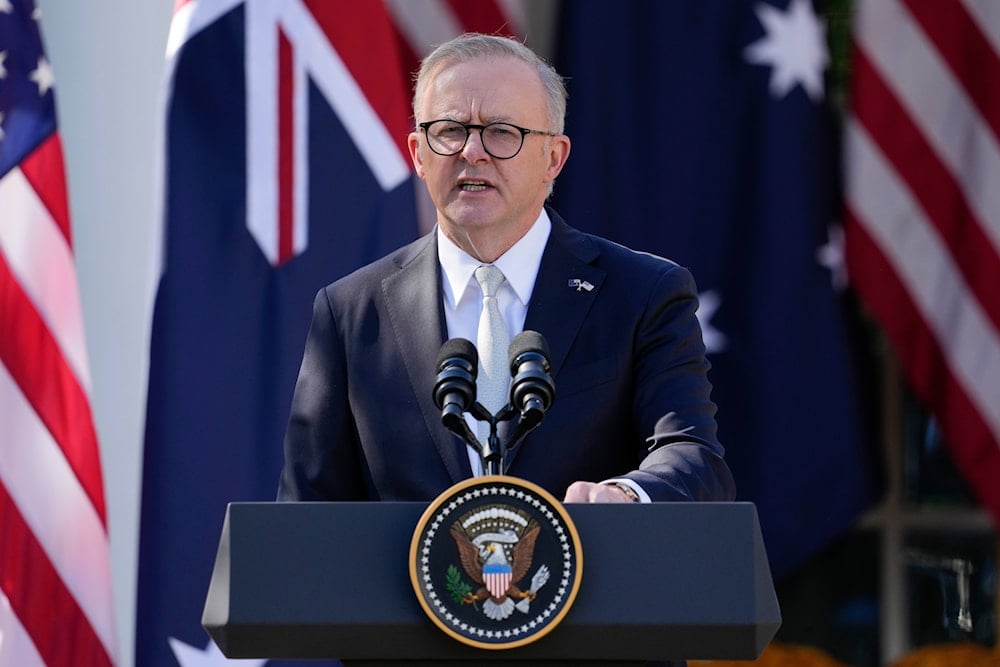Netanyahu 'in denial' over humanitarian crisis in Gaza: Australian PM
Australian PM Anthony Albanese says Netanyahu is "in denial" over Gaza’s humanitarian crisis as Australia’s recognition of a Palestinian state marks a historic break in "Israel"-Australia relations.
-

Australia's Prime Minister Anthony Albanese speaks during a news conference in the Rose Garden of the White House with President Joe Biden, in Washington on October 25, 2023. (AP Photo/Manuel Balce Ceneta)
Australian Prime Minister Anthony Albanese accused Israeli Prime Minister Benjamin Netanyahu on Tuesday of being "in denial" about the humanitarian catastrophe in Gaza, one day after announcing that Australia will recognise a Palestinian state for the first time.
The announcement marks the culmination of nearly three years of diplomatic tension between Canberra and "Israel", including major policy reversals and unprecedented sanctions on senior Israeli officials.
Albanese’s latest comments followed a Thursday phone call with Netanyahu, during which the Israeli leader reportedly dismissed concerns over the humanitarian toll in Gaza. "He again reiterated to me what he has said publicly as well, which is to be in denial about the consequences that are occurring for innocent people," Albanese told state broadcaster ABC.
The prime minister also tied the recognition decision to frustration with Netanyahu’s government, accusing it of defying international law and ignoring allied warnings.
From al-Quds reversal to Palestinian recognition
Relations between Australia and "Israel" have been under strain since October 2022, when the left-leaning Albanese government reversed the right-leaning Morrison administration’s 2018 recognition of West al-Quds as "Israel’s" capital. At the time, Foreign Minister Penny Wong described the original recognition as a “cynical play” for votes and a move that “put Australia out of step with the majority of the international community”.
The start of the war on Gaza in October 2023 further accelerated the rift. By August 2025, Australia confirmed it would formally recognise a Palestinian state at the UN General Assembly in September. Netanyahu denounced the move as "shameful" and linked it to rising antisemitism in Australia.
Globally, Australia joins 147 UN member states that have recognised or pledged to recognise Palestinian statehood.
Australian Foreign Minister #PennyWong has called on "Israel" to drop its plans to occupy #Gaza, warning the move could worsen the humanitarian catastrophe in the enclave and constitute a breach of international law.
— Al Mayadeen English (@MayadeenEnglish) August 8, 2025
In remarks to Guardian Australia, Wong pushed back on Israeli… pic.twitter.com/pWLbKFf9zW
Conditions for recognition
Australia’s recognition is conditional on commitments from the Palestinian Authority, including:
- No role for Hamas or other armed factions in governance
- Demilitarisation of Gaza
- Holding general elections
Sanctions, ICC support, and policy breaks
It is worth mentioning that in recent years, Canberra has taken an increasingly critical stance toward "Israel". In June 2025, it joined Canada, New Zealand, Norway, and the UK in sanctioning far-right Israeli ministers Itamar Ben-Gvir and Bezalel Smotrich for "inciting extremist violence" in the West Bank.
These sanctions followed earlier measures against settlers and vocal support for the International Criminal Court’s independence after it issued arrest warrants for Netanyahu and former Security Minister Yoav Gallant in 2024.
In a press release, Britain announced that it, alongside #Australia, #Canada, #New Zealand, and #Norway, has sanctioned Israeli Ministers Itamar Ben-Gvir and Bezalel Smotrich for their "repeated incitements of violence against Palestinian communities" in the occupied #WestBank,"… pic.twitter.com/f1ueD5Ytvg
— Al Mayadeen English (@MayadeenEnglish) June 10, 2025
At home, the decision reflects shifting public opinion. Protests demanding aid for Gaza have drawn tens of thousands in Sydney, and polls show a majority of Australians supporting urgent action to address the humanitarian crisis.
However, opposition leader Sussan Ley has warned the move risks damaging relations with the US and undermining decades of bipartisan policy toward "Israel".

 3 Min Read
3 Min Read










